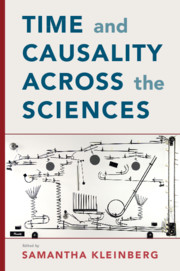Refine listing
Actions for selected content:
1437 results in Ebooks in machine learning
5 - Causation in a Physical World: An Overview of Our Emerging Understanding
-
- Book:
- Time and Causality across the Sciences
- Published online:
- 24 September 2019
- Print publication:
- 26 September 2019, pp 72-85
-
- Chapter
- Export citation
Contents
-
- Book:
- Time and Causality across the Sciences
- Published online:
- 24 September 2019
- Print publication:
- 26 September 2019, pp v-vii
-
- Chapter
- Export citation
1 - An Introduction to Time and Causality
-
- Book:
- Time and Causality across the Sciences
- Published online:
- 24 September 2019
- Print publication:
- 26 September 2019, pp 1-13
-
- Chapter
- Export citation
8 - Causation, Time Asymmetry, and Causal Mechanisms in the Social Sciences
-
- Book:
- Time and Causality across the Sciences
- Published online:
- 24 September 2019
- Print publication:
- 26 September 2019, pp 138-157
-
- Chapter
- Export citation
Index
-
- Book:
- Time and Causality across the Sciences
- Published online:
- 24 September 2019
- Print publication:
- 26 September 2019, pp 256-262
-
- Chapter
- Export citation
Frontmatter
-
- Book:
- Time and Causality across the Sciences
- Published online:
- 24 September 2019
- Print publication:
- 26 September 2019, pp i-iv
-
- Chapter
- Export citation
9 - Temporalization in Causal Modeling
-
- Book:
- Time and Causality across the Sciences
- Published online:
- 24 September 2019
- Print publication:
- 26 September 2019, pp 158-186
-
- Chapter
- Export citation
References
-
- Book:
- Time and Causality across the Sciences
- Published online:
- 24 September 2019
- Print publication:
- 26 September 2019, pp 236-255
-
- Chapter
- Export citation
6 - Intervening in Time
-
- Book:
- Time and Causality across the Sciences
- Published online:
- 24 September 2019
- Print publication:
- 26 September 2019, pp 86-115
-
- Chapter
- Export citation
11 - Overcoming the Poverty of Mechanism in Causal Models
-
- Book:
- Time and Causality across the Sciences
- Published online:
- 24 September 2019
- Print publication:
- 26 September 2019, pp 212-235
-
- Chapter
- Export citation
List of Contributors
-
- Book:
- Time and Causality across the Sciences
- Published online:
- 24 September 2019
- Print publication:
- 26 September 2019, pp viii-x
-
- Chapter
- Export citation
10 - Reintroducing Dynamics into Static Causal Models
-
- Book:
- Time and Causality across the Sciences
- Published online:
- 24 September 2019
- Print publication:
- 26 September 2019, pp 187-211
-
- Chapter
- Export citation
7 - Time–Event Relationships as Representations for Constructing Cell Mechanisms
-
- Book:
- Time and Causality across the Sciences
- Published online:
- 24 September 2019
- Print publication:
- 26 September 2019, pp 116-137
-
- Chapter
- Export citation
2 - Causality and Time: An Introductory Typology
-
- Book:
- Time and Causality across the Sciences
- Published online:
- 24 September 2019
- Print publication:
- 26 September 2019, pp 14-36
-
- Chapter
- Export citation
4 - On the Causal Nature of Time
-
- Book:
- Time and Causality across the Sciences
- Published online:
- 24 September 2019
- Print publication:
- 26 September 2019, pp 49-71
-
- Chapter
- Export citation
3 - The Direction of Causation
-
- Book:
- Time and Causality across the Sciences
- Published online:
- 24 September 2019
- Print publication:
- 26 September 2019, pp 37-48
-
- Chapter
- Export citation

Time and Causality across the Sciences
-
- Published online:
- 24 September 2019
- Print publication:
- 26 September 2019
Bibliography
-
- Book:
- Variational Bayesian Learning Theory
- Published online:
- 24 June 2019
- Print publication:
- 11 July 2019, pp 529-539
-
- Chapter
- Export citation
10 - Network Data
-
- Book:
- Model-Based Clustering and Classification for Data Science
- Published online:
- 14 June 2019
- Print publication:
- 11 July 2019, pp 292-330
-
- Chapter
- Export citation
1 - Introduction
-
- Book:
- Model-Based Clustering and Classification for Data Science
- Published online:
- 14 June 2019
- Print publication:
- 11 July 2019, pp 1-14
-
- Chapter
- Export citation
